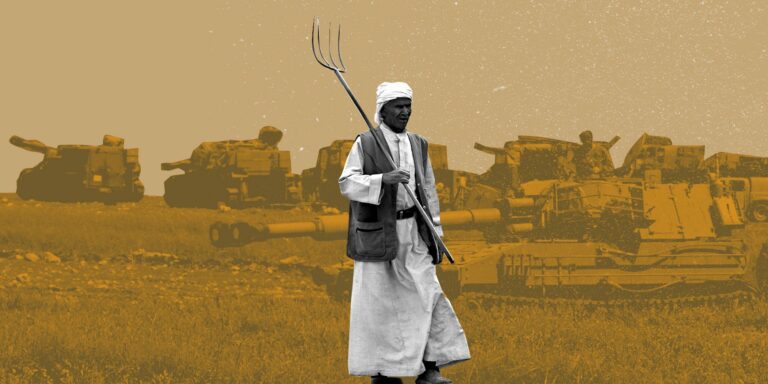For some six months Bakhmut has been the center of attention in the Ukrainian war. The industrial town of some 70,000 people before the war has become a “meat grinder,” in which thousands upon thousands of young men from both sides are thrown. In many ways, Bakhmut symbolizes the war in Ukraine today.
Western analysts have repeatedly said that Bakhmut does not represent enough strategic importance for such overwhelming military resources to be deployed. They say Bakhmut has become a symbol for Russian President Vladimir Putin, who just wants a sign of victory. Militarily, the Russian sacrifices do not at all match the town’s significance.
The problem with this analysis is that the Ukrainian side is investing enormous resources for the town’s defense. If the Russian decision to fight a war of attrition is looked down upon as “stupidity,” then the Ukrainian decision to fight back in Bakhmut can also be described as a “mistake.”
A deeper lying problem with such an analysis is a misunderstanding of the current stage of the war. Unlike Russia’s recent February offensive or the Ukrainian counter offensive in Kharkiv and Kherson last summer, the war is no longer mobile.
It is no longer a matter of rapid attacks with the aim of a rapid victory, but a gruesome war of attrition with the aim of destroying a large number of enemy troops and material. In this new phase of the war, it does not matter much if it takes place in Bakhmut or anywhere else.
Changing War Aims
What is the link between the battle for Bakhmut with the overall objectives of the war in Ukraine?
The goals of the war have shifted several times. Putin’s initial aim, as defined in his February 21, 2022, speech just before the invasion of Ukraine, was the dismantling of the Ukrainian state and its subjugation to Russia.
According to Putin, Ukraine was not a proper nation and therefore did not deserve sovereignty. Moreover, Putin regarded the democratic changes taking place in Ukraine as hostile, as well as a sign of anarchy and weakness.
The Russian invasion was supposed to be short and easy. Yet, in a matter of days it became clear just how wrong the Russian leadership was.
As early as spring 2022 there were negotiations between Russia and Ukraine about a possible ceasefire. The condition back then was that the both sides would keep their ground, stop military operations, and clear the way for further political negotiations.
By then, Putin had changed his war objectives. As it was not possible to occupy the whole of Ukraine, he wanted the east and southern Ukraine. The “referendums” of September 2022 to annex Donetsk, Luhansk, Kherson and Zaporizhia belatedly reflected the revised Russian war aims.
But they came too late. By then Ukraine was on the counter-offensive and the spring negotiations were dead.
Ukraine’s war aims changed too: from an immediate cease-fire and a return to the February 24 positions to demanding the liberation of all Ukrainian territories, including those beyond the February 24 line, such as the eastern regions of Donbas and Crimea, which was annexed by Russia in 2014.
Winning the War and Negotiating with Russia
The much-publicized Russian offensive did not reach too far west of the initial frontline. It is always risky to predict the future, but the much-anticipated Ukrainian spring offensive may not reach too far east either. At least, not far enough to make a difference in the current war.
Yet, one thing is certain, the cost of months of more fighting will run into tens of thousands of more casualties on both sides.
There is a debate in Europe whether it is possible to negotiate with Putin. The problem put forward is that Putin cannot be trusted, and that a ceasefire will only allow Putin to regain his forces and attack again.
The arrest warrant against Putin issued by the International Criminal Court is yet another step blocking the possibility of negotiating with Putin.
However, the argument can also be made that the war has “empowered” Putin, as he needs this war more than anyone else. It justifies his failures and legitimizes his war as an act of “self-defense” against the aggressive West, which collectively aims to dismantle Russia.
In reality, Putin has already lost this war. Not only has he failed in his own aggression by an erroneous, ideological reading of Ukrainian reality. In addition, his failure has also destroyed the foundations of his legacy.
Putin came to power after a decade and a half of Russian political turmoil and economic downturn. When he entered the scene in the year 2000 he made a deal with the oligarchs: give up your political ambitions and enjoy a limitless hedonistic lifestyle with private jets and real estate in London and the Côte d’Azur.
He made a similar deal with the Russian populace. As he confiscated their newly achieved political freedoms, he promised economic stability in return, as well as to reestablish Russia’s lost former glory. All this was wrapped up in a nationalistic discourse the essence of which was that Russia was strong because it had a strong army.
Yet, the failed war in Ukraine exposed the emptiness of Putin’s propaganda. The Russian army has proven disorganized and technologically backward. Putin has destroyed the consumerist consensus with his oligarchs and the socio-economic stability back home.
Any cease-fire will only expose the defeat of political Putinism, rather than enable him to prepare for a new offensive.






